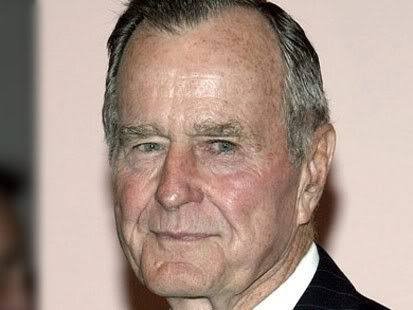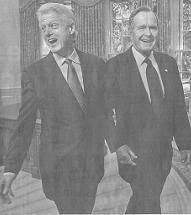
Ever since Brent Scowcroft wrote an op-ed in the WSJ recommending that Bush the Lesser not attack Iraq, political pundits and journalists have been putting forth that it was the elder Bush's way to broadcast that he was opposed to it and to try to talk his son out of taking the nation to war in Iraq.
Not so.
Pundits seemed to base their belief about the elder Bush's opposition to his son's plans on the fact that Scowcroft was, after all, the elder Bush's national security adviser and one of his closest friends for decades, as well as on the elder Bush's own defense of his controversial decision not to attack Baghdad and topple Saddam in 1991:
"Trying to eliminate Saddam ... would have incurred incalculable human and political costs ... Had we gone the invasion route, the United States could conceivably still be an occupying power in a bitterly hostile land"
To be fair to the pundits and journalists, Bush 41 went to great lengths to create the impression that he was conflicted, at the least, about his son's plans. In a book that was published in the spring of 2004 (The Bushes: Portrait of a Dynasty), the authors cite an interview they had in the summer of 2002 with the elder Bush's sister. She said her brother had expressed his "anguish" about the administration's preparations for war:
"But do they have an exit strategy?" the former President is quoted as worrying.
"Although he never went public with them," the authors assert, "the President's own father shared many of [the] concerns" of Brent Scowcroft, his national security adviser and a leading war opponent.
Yet close friends and associates said the older Bush, while fiercely proud and protective of his son, nevertheless harbors concerns about the war and its aftermath.
The New York Daily News reported:
"'Although he never went public with them,' the authors assert, 'the President's own father shared many of [the] concerns' of Brent Scowcroft, his national security adviser and a leading war opponent. Close friends and associates said the older Bush, while fiercely proud and protective of his son, nevertheless harbors concerns about the war and its aftermath. These sources told The News that aside from his 'exit-strategy' fears of a prolonged, bloody conflict, the ex-President is troubled that the war fractured the international coalition he painstakingly assembled to expel deposed Iraqi dictator Saddam Hussein from Kuwait in 1991. One close associate said the older Bush feels Vice President Cheney and Secretary of Defense Donald Rumsfeld may have pushed President Bush too hard for a preemptive strike. One well-placed Bush colleague said the older Bush recently acknowledged, 'I'm having trouble with my boy,' referring to Iraq."
At the time, a top Bush aide denied the allegations in the Schweizer book to the NY Daily News, saying that Bush the elder supported his son on the war in Iraq without reservations "from the very first day." The book is hardly a hit piece. The authors, Peter and Rochelle Schweitzer, were given unprecedented access to and enjoyed the cooperation of the Bush family and their friends; the history of the family is presented in a positive light.
Pundits and journalists embraced the denied version, ignoring what the elder Bush and his closest aides were saying publicly (that he supported his son's decision), even during the campaign for the 2004 election when, (Emotional Elder Bush Attacks Son's Critics):
An emotional former President George H.W. Bush Tuesday defended his son's Iraq war and lashed out at White House critics.
It is "deeply offensive and contemptible" to hear "elites and intellectuals on the campaign trail" dismiss progress in Iraq since last year's overthrow of Iraqi leader Saddam Hussein, the elder Bush said in a speech to the National Petrochemical and Refiners Association annual convention.
"There is something ignorant in the way they dismiss the overthrow of a brutal dictator and the sowing of the seeds of basic human freedom in that troubled part of the world," he said.
The former president appeared to fight back tears as he complained about media coverage of the younger Bush that he called "something short of fair and balanced."
"It hurts an awful lot more when it's your son that is being criticized than when they used to get all over my case," said Bush, who has often complained about media coverage of both Bush presidencies.
Iraq has been torn by violence and instability since a U.S.-led invasion last year toppled Saddam in the hunt for his alleged weapons of mass destruction. No such weapons have been found but the Bush administration says progress toward a stable democracy is being made.
The former president, who waged the first Gulf War against Saddam in 1991, described progress in Iraq as "a miracle."
"Iraq is moving forward in hope and not sliding back into despair and terrorism," he said.
I never bought the 'kinder, gentler' George H.W. Bush (not when he was in office or after he was ousted in the 1992 election), nor that he was ever not completely on board with his son's aggression on Iraq. Just as I've never bought that Hillary Clinton was deceived by Bush and Cheney before voting to authorize the war in Iraq. She is a careful and deliberate taskmaster, married to a former president who was getting daily briefings by the CIA. I do not believe that she didn't discuss the situation thoroughly with her husband (who is also her chief advisor) before casting the most important vote of her political career.
In the years since this war has gone south and has proven to be the worst mistake probably ever undertaken by an American president, the elder Bush has encouraged the pundits to believe he wasn't for the war by insinuating that he's "a father first, who loves and supports his son," hence, "don't expect (as you would from former presidents) any sense of patriotism, duty and loyalty first to the country and Constitution" from him. The media laid off former President Bush, as well as his BBF ('Best Friend Forever'), former President Clinton.

So again, back declaring his unabashed love for his son and "his president," ABC News reports:
Former president George H.W. Bush forcefully defended his son's handling of the Iraq war Thursday, saying critics of the current president have forgotten the "extraordinary brutality" of deposed Iraqi leader Saddam Hussein.
"Do they want to bring back Saddam Hussein, these critics?" the elder Bush told USA TODAY in a rare interview. "Do they want to go back to the status quo ante? I don't know what they are talking about here. Do they think life would be better in the Middle East if Saddam were still there?"
Bush, 83, was interviewed in a replica of the White House Situation Room at his remodeled presidential library. The Bush Presidential Library and Museum, on the grounds of Texas A&M, is reopening Saturday after an $8.3 million renovation. The added features include the Situation Room and an interactive computer program that allows visitors to consider options Bush weighed during the Gulf War.
In one key decision, Bush rejected calls to topple Saddam, instead declaring the war over after Iraqi forces withdrew from Kuwait. The program calls the idea of going to Baghdad "very tempting" but says it "would have been a disastrous decision," splintering the international coalition and leaving U.S. and possibly British troops on their own in Iraq.
"It's not second-guessed quite so much today, but it was second-guessed" at the time, Bush said of his judgment that combat should end. "But the coalition was formed with my word to the various international leaders, 'The objective is to kick Saddam Hussein out of Kuwait,' " not some further-reaching goal.
Bush dismissed a question about whether his son should have used similar reasoning before invading Iraq in 2003. Saddam fled into hiding, was captured and executed after a trial. About 165,000 U.S. troops remain deployed there during the war's fifth year.
Other analysts have made the comparison, however. "Historians, I believe, will say he made a wise judgment on what could be expected if we went into Iraq," presidential historian Robert Dallek says. "By contrast, Bush 43 has found his presidency ruined, one might say, by this Iraq war."
The elder Bush reacted testily when asked about criticism of his son. "I don't reminisce with … my friends like you about what my son does or doesn't do," Bush said. But "I think we forget even today the extraordinary brutality of Saddam Hussein."
Including his plans to assassinate the elder Bush?
"Well, that didn't endear him to me at all," he said.
Reporters are still fixated on this story, debunked years ago and written about by Seymour Hersh in the November 1, 1993 edition of the New Yorker, "A Case Not Closed":
“A senior White House official recently told me that one of the seemingly most persuasive elements of the report had been overstated and was essentially incorrect. And none of the Clinton Administration officials I interviewed over a ten-week period this summer claimed that there was any empirical evidence -- a “smoking gun” -- directly linking Saddam or any of his senior advisers to the alleged assassination attempt. . . ."
This did not stop President Bill Clinton from using the story of an attempt on ex-President Bush's life as an opportunity to whittle down Saddam Hussein's operations:
On Saturday, June 26, 1993, twenty-three Tomahawk guided missiles, each loaded with a thousand pounds of high explosives, were fired from American Navy warships in the Persian Gulf and the Red Sea at the headquarters complex of the Mukhabarat, the Iraqi intelligence service, in downtown Baghdad....
Three of the million-dollar missiles missed their target and landed on nearby homes, killing eight civilians, including Layla al-Attar, one of Iraq’s most gifted artists. The death toll was considered acceptable by the White House; after all, scores of civilians had been killed in the Reagan Administration’s F-111 bombing attack on Muammar Qaddafi’s house-and-office complex in Tripoli Libya, in 1986....
We responded with an over-the-top reaction to a, basically, unfounded claim.
The former president rarely agrees to interviews, although he appeared on Fox News Sunday this week and taped an interview with C-SPAN Thursday to talk about his revamped library. Questions like those raised by USA TODAY are one reason he generally eschews the press, he said.
"You're here to talk about the library," he said, not about the current president. "He has my full, unequivocal support. I feel about him great respect for what he's doing and tries to do, and I think much of the criticism is grossly unfair. … That's a father caring about his son and his president."
Say what you will about Jimmy Carter, he's got the courage of his convictions (Jimmy Carter Slams Iraq War, Sees Gitmo Trials As An 'Impetus' For Terrorism).

No comments:
Post a Comment